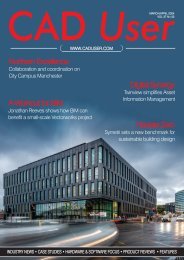Create successful ePaper yourself
Turn your PDF publications into a flip-book with our unique Google optimized e-Paper software.
Dm ANALYSIS: EMAIL MANAGEMENT<br />
Poor email management<br />
draining productivity<br />
New research finds 32% of employees spend<br />
nearly one working day per week managing<br />
email inboxes<br />
Email remains easily the most-used<br />
and most important<br />
communication tool but a lack of<br />
email management is having a major<br />
impact on business productivity. These<br />
are among the findings of research<br />
published by Mail Manager which<br />
surveyed more than 1,000 decisionmakers<br />
from organisations in the UK<br />
and USA.<br />
The Email and Document Management<br />
Usage Benchmark report found that<br />
more than nine out of ten employees<br />
(91%) use email to communicate with<br />
their clients, while 61% prefer to use it<br />
more than any other form of<br />
communication tool. By comparison,<br />
11% of respondents said their preferred<br />
medium was Skype and WhatsApp and<br />
5% prefer to use Slack.<br />
However, the continued inefficient use<br />
and management of email has led to it<br />
having a major effect on businesses'<br />
efficiency and productivity. One-third of<br />
respondents (32%) spend at least one<br />
hour per day - the equivalent of nearly<br />
one working day per week - managing<br />
their email inboxes and 70% believe it's<br />
one of the biggest productivity drains on<br />
the workforce. Furthermore, 73% of<br />
respondents say that too much time is<br />
wasted on trying to find emails and 38%<br />
believe 'it's not very easy' to find<br />
information in their inbox.<br />
Jacob Wardrop, Commercial Director at<br />
Mail Manager said: "Email is the letter of<br />
today. While tools like Slack and<br />
WhatsApp are great for informal<br />
correspondence and chat, email remains<br />
the core correspondence method for<br />
formal communication. Before the<br />
digital era, companies would send<br />
formal correspondence as letters, which<br />
would be physically stored. Now, email<br />
is the tool for formal correspondence,<br />
but the need for filing and securely<br />
storing this communication remains,<br />
even though it's digital."<br />
Less than half of organisations (46%)<br />
use a formal, paid-for email<br />
management solution and only 35% use<br />
a dedicated document management<br />
solution. As a result, 46% of the<br />
respondents said they save or store less<br />
than half of their emails, while 62% still<br />
keep hard copies of emails.<br />
Furthermore, nearly a quarter of<br />
respondents (23%) said that email filing<br />
isn't considered part of their quality<br />
management procedure.<br />
The knock-on effect of this is<br />
employees being left frustrated by not<br />
being able to find specific documents in<br />
their inbox (56%), which ends up with<br />
them wasting time (60%), being less<br />
productive (50%) and losing visibility of<br />
project information through the lack of<br />
a paper trail (52%).<br />
EMAIL VITAL TO BUSINESS<br />
COMMUNICATION<br />
Email continues to be used for a wide<br />
range of business purposes, with the<br />
most common being internal and team<br />
communications (74%) and client<br />
communication (70%).<br />
It's also vital to tasks like sharing<br />
project work internally (68%), sharing<br />
contracts (65%) and important<br />
documentation (63%), and sharing<br />
project work with clients (62%).<br />
The research also highlighted the<br />
importance of managing email, with<br />
respondents claiming it's essential to<br />
delivering good record management<br />
(87%), providing better information<br />
visibility (86%) and quality management<br />
(84%). While 84% of respondents also<br />
claimed that poor email management<br />
could have significant consequences for<br />
their business.<br />
"This insight from businesses in the UK<br />
and the US shows they face common<br />
issues when it comes to email and<br />
document management", commented<br />
Wardrop. "It's clear that email remains<br />
vital to employees being as effective as<br />
possible and maintaining strong<br />
relationships with their clients. However,<br />
businesses still aren't deploying effective<br />
email and document management<br />
solutions that make their employees'<br />
lives easier and help them quickly find<br />
the documents and information they<br />
need when they need it. As a result,<br />
people are still being frustrated by<br />
wasting time digging through their<br />
email inboxes, which means they can't<br />
be as productive as they and their<br />
employers want them to be."<br />
More info: www.mailmanager.com<br />
34<br />
@<strong>DM</strong>MagAndAwards<br />
<strong>Jan</strong>uary/<strong>Feb</strong>ruary <strong>2021</strong><br />
www.document-manager.com

















